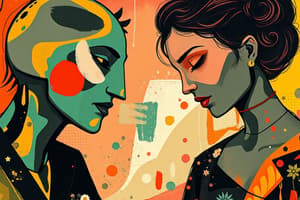Podcast
Questions and Answers
What is the main aim of fiction?
What is the main aim of fiction?
To entertain and inspire all those who read it.
What is a key difference between fiction and literature?
What is a key difference between fiction and literature?
Fiction is written to be read for pleasure, while literature is writing that has themes and symbolism that require careful analysis and comprehension.
What is literature considered to be, in terms of sophistication and intelligence?
What is literature considered to be, in terms of sophistication and intelligence?
More sophisticated and intelligent.
What do many fictional stories explore in addition to entertaining?
What do many fictional stories explore in addition to entertaining?
What is the relationship between fiction and literature?
What is the relationship between fiction and literature?
What is the main purpose of stories that aim to educate the reader?
What is the main purpose of stories that aim to educate the reader?
What is the term used to describe the fight between the protagonist and the antagonist in a story?
What is the term used to describe the fight between the protagonist and the antagonist in a story?
What is the term used to describe the most exciting part of the plot in a story?
What is the term used to describe the most exciting part of the plot in a story?
What is the name of the oldest known fictional story?
What is the name of the oldest known fictional story?
What is the term used to describe the technique of showing rather than telling in fiction writing?
What is the term used to describe the technique of showing rather than telling in fiction writing?
Flashcards are hidden until you start studying
Study Notes
Fiction vs. Literature
- Literature is an umbrella term that encompasses many genres, forms, and styles of writing, including fiction and non-fiction.
- Fiction is a type of literature, but not all literature is fiction, as poetry, plays, and other forms of writing are also considered literature.
Characteristics of Fiction
- Fiction is written to be read for pleasure, with clear themes, interesting characters, and an exciting plot.
- The main aim of fiction is to entertain and inspire readers, taking them into imaginary worlds and introducing them to characters who grow, change, and develop.
- Fiction can explore moral messages, emotions, and topics, aiming to educate readers and teach them something new.
Elements of Fiction
- A protagonist is the hero of the story, while an antagonist is the villain.
- The conflict is the fight between the protagonist and the antagonist, and can take five basic forms: person vs. self, person vs. person, person vs. society, person vs. nature, and person vs. supernatural.
- The plot must have a beginning, middle, and end, with a climax as the most exciting part.
- Fiction is about what the protagonist wants and who or what is stopping them from getting it, with character change and development being key.
Writing Techniques
- The "show don't tell" technique is used to show the reader what's happening, rather than just telling them exactly what happens.
- Story mapping is a technique that helps pupils plan and structure their story visually.
Interesting Facts
- The world's oldest known fictional story is the 'Epic of Gilgamesh', an adventure story written in the style of a poem.
- Modern examples of fiction include films, video games, anime, manga, comic books, TV shows, and cartoons.
Seven Important Elements of Fiction
- Character: a person, animal, being, creature, or thing that you write into your fiction writing story.
- Plot: the series of events and actions that make up the narrative of a story.
- Other elements include theme, setting, point of view, style, and tone.
Studying That Suits You
Use AI to generate personalized quizzes and flashcards to suit your learning preferences.




